Impact of Cultural Values on Families and Communities' Health: Essay
VerifiedAdded on 2022/12/19
|8
|2888
|60
Essay
AI Summary
This essay delves into the impact of cultural and social values, beliefs, and practices on families and communities, particularly within the context of contemporary parenting. It explores the challenges faced by parents, using the example of strict parenting, and discusses the influence of religion, family structure diversity, and societal expectations on child development. The essay examines different facets of child development, including physical, intellectual, social, emotional, cognitive, and moral development, highlighting the importance of monitoring and addressing potential issues. It also elucidates the crucial role of child and family health care nurses in supporting parents, providing emotional support, expert advice, and resources to enhance parenting skills. The essay concludes by emphasizing the interconnectedness of cultural values, parenting practices, child development, and the supportive role of healthcare professionals in fostering healthy families and communities.
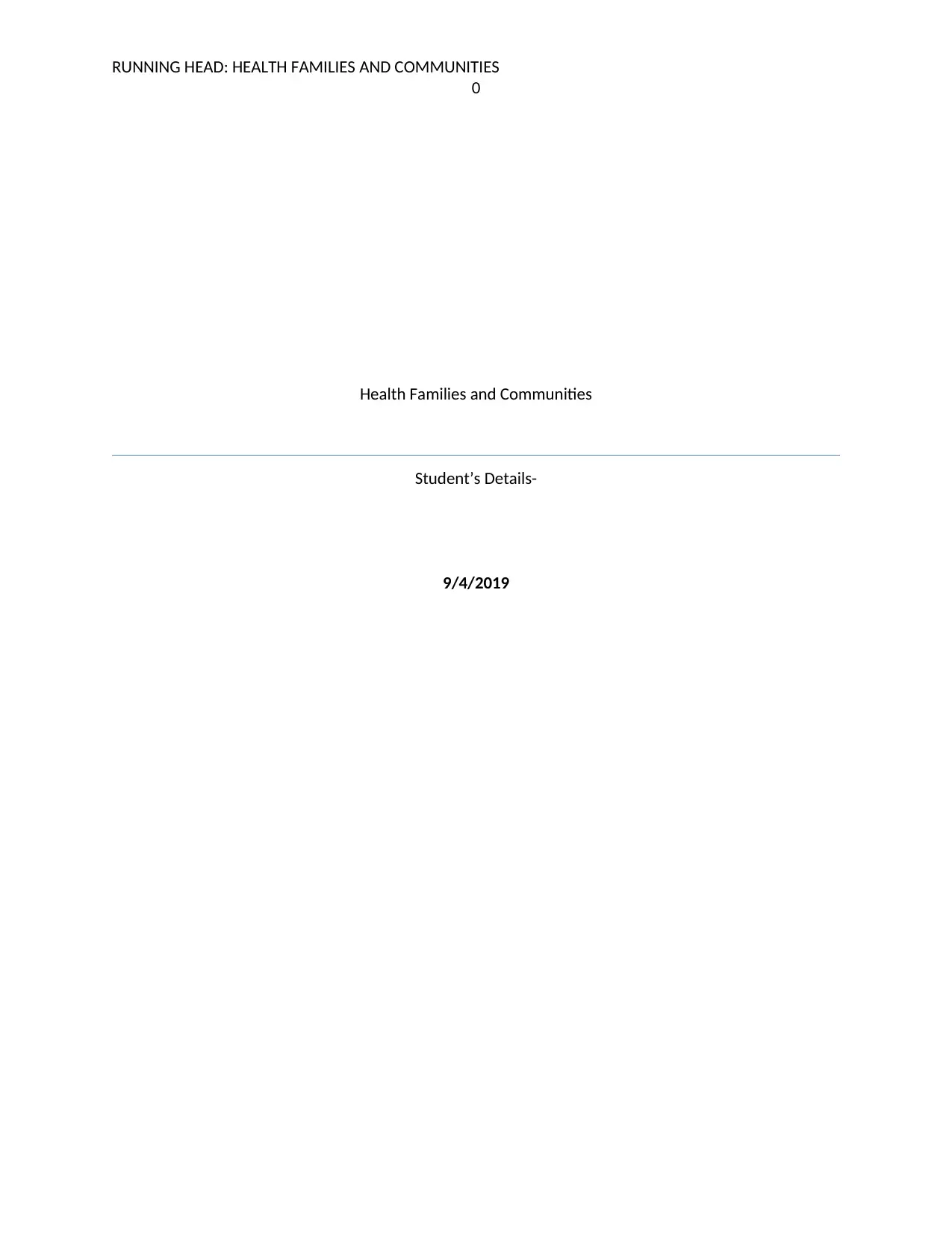
RUNNING HEAD: HEALTH FAMILIES AND COMMUNITIES
0
Health Families and Communities
Student’s Details-
9/4/2019
0
Health Families and Communities
Student’s Details-
9/4/2019
Paraphrase This Document
Need a fresh take? Get an instant paraphrase of this document with our AI Paraphraser
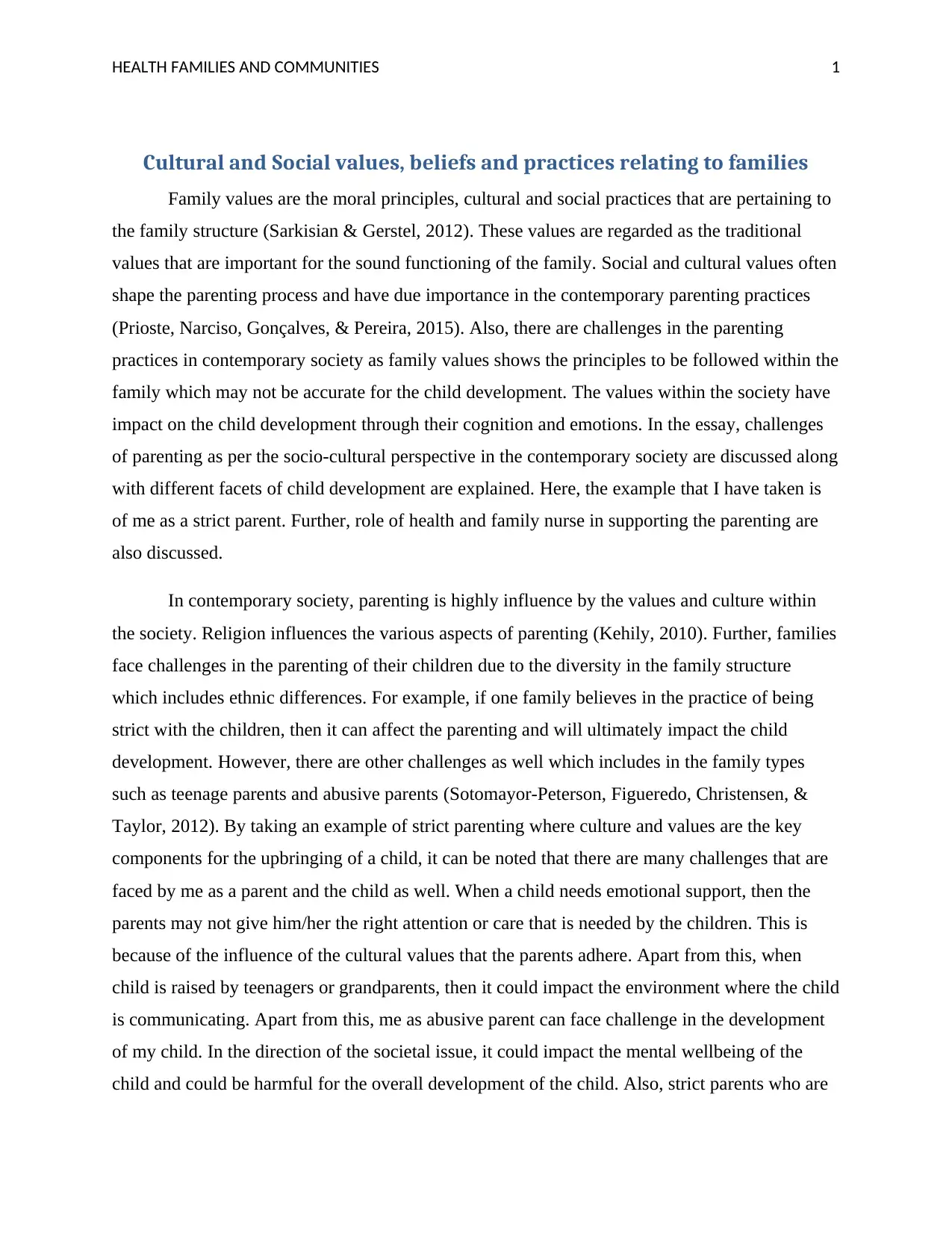
HEALTH FAMILIES AND COMMUNITIES 1
Cultural and Social values, beliefs and practices relating to families
Family values are the moral principles, cultural and social practices that are pertaining to
the family structure (Sarkisian & Gerstel, 2012). These values are regarded as the traditional
values that are important for the sound functioning of the family. Social and cultural values often
shape the parenting process and have due importance in the contemporary parenting practices
(Prioste, Narciso, Gonçalves, & Pereira, 2015). Also, there are challenges in the parenting
practices in contemporary society as family values shows the principles to be followed within the
family which may not be accurate for the child development. The values within the society have
impact on the child development through their cognition and emotions. In the essay, challenges
of parenting as per the socio-cultural perspective in the contemporary society are discussed along
with different facets of child development are explained. Here, the example that I have taken is
of me as a strict parent. Further, role of health and family nurse in supporting the parenting are
also discussed.
In contemporary society, parenting is highly influence by the values and culture within
the society. Religion influences the various aspects of parenting (Kehily, 2010). Further, families
face challenges in the parenting of their children due to the diversity in the family structure
which includes ethnic differences. For example, if one family believes in the practice of being
strict with the children, then it can affect the parenting and will ultimately impact the child
development. However, there are other challenges as well which includes in the family types
such as teenage parents and abusive parents (Sotomayor‐Peterson, Figueredo, Christensen, &
Taylor, 2012). By taking an example of strict parenting where culture and values are the key
components for the upbringing of a child, it can be noted that there are many challenges that are
faced by me as a parent and the child as well. When a child needs emotional support, then the
parents may not give him/her the right attention or care that is needed by the children. This is
because of the influence of the cultural values that the parents adhere. Apart from this, when
child is raised by teenagers or grandparents, then it could impact the environment where the child
is communicating. Apart from this, me as abusive parent can face challenge in the development
of my child. In the direction of the societal issue, it could impact the mental wellbeing of the
child and could be harmful for the overall development of the child. Also, strict parents who are
Cultural and Social values, beliefs and practices relating to families
Family values are the moral principles, cultural and social practices that are pertaining to
the family structure (Sarkisian & Gerstel, 2012). These values are regarded as the traditional
values that are important for the sound functioning of the family. Social and cultural values often
shape the parenting process and have due importance in the contemporary parenting practices
(Prioste, Narciso, Gonçalves, & Pereira, 2015). Also, there are challenges in the parenting
practices in contemporary society as family values shows the principles to be followed within the
family which may not be accurate for the child development. The values within the society have
impact on the child development through their cognition and emotions. In the essay, challenges
of parenting as per the socio-cultural perspective in the contemporary society are discussed along
with different facets of child development are explained. Here, the example that I have taken is
of me as a strict parent. Further, role of health and family nurse in supporting the parenting are
also discussed.
In contemporary society, parenting is highly influence by the values and culture within
the society. Religion influences the various aspects of parenting (Kehily, 2010). Further, families
face challenges in the parenting of their children due to the diversity in the family structure
which includes ethnic differences. For example, if one family believes in the practice of being
strict with the children, then it can affect the parenting and will ultimately impact the child
development. However, there are other challenges as well which includes in the family types
such as teenage parents and abusive parents (Sotomayor‐Peterson, Figueredo, Christensen, &
Taylor, 2012). By taking an example of strict parenting where culture and values are the key
components for the upbringing of a child, it can be noted that there are many challenges that are
faced by me as a parent and the child as well. When a child needs emotional support, then the
parents may not give him/her the right attention or care that is needed by the children. This is
because of the influence of the cultural values that the parents adhere. Apart from this, when
child is raised by teenagers or grandparents, then it could impact the environment where the child
is communicating. Apart from this, me as abusive parent can face challenge in the development
of my child. In the direction of the societal issue, it could impact the mental wellbeing of the
child and could be harmful for the overall development of the child. Also, strict parents who are
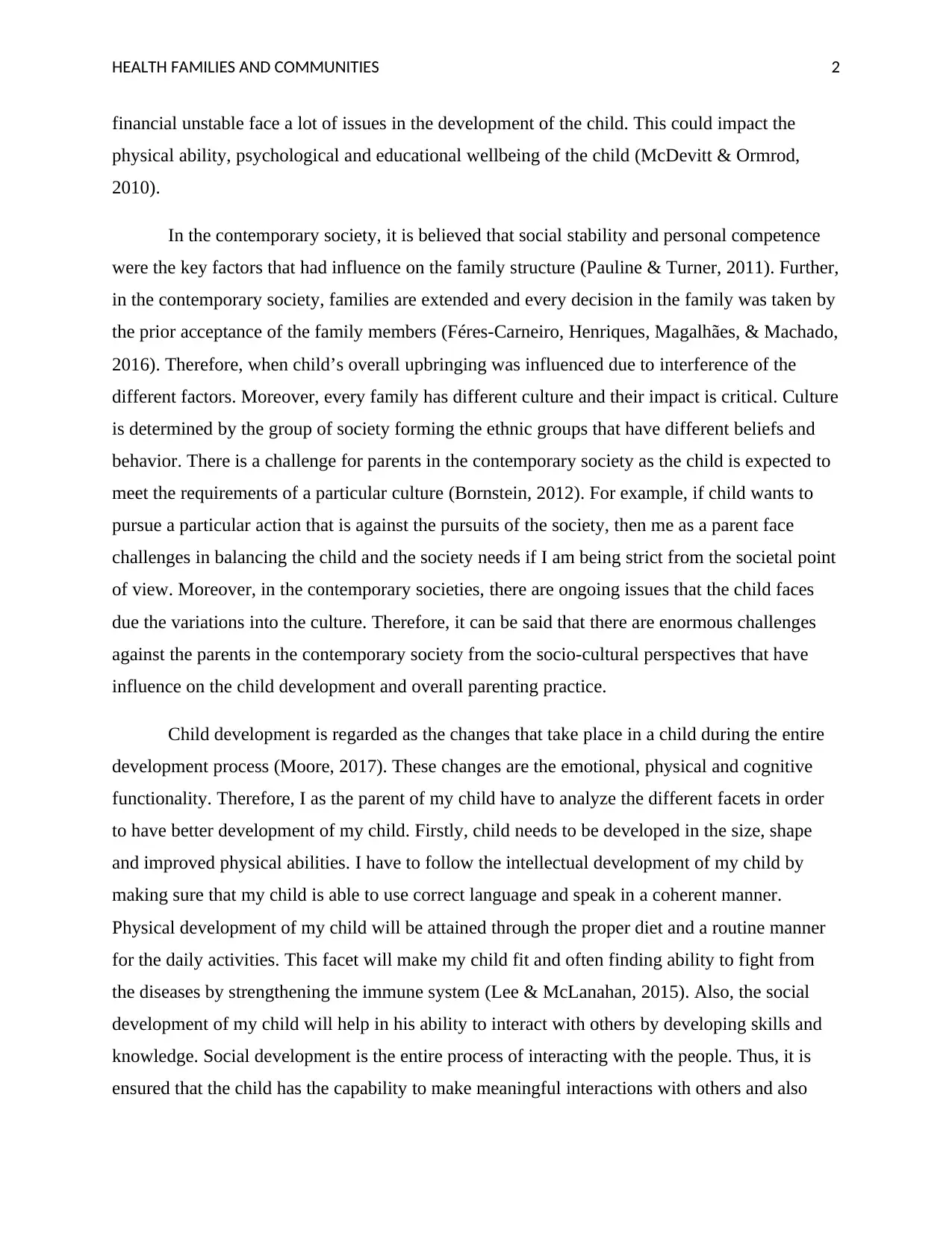
HEALTH FAMILIES AND COMMUNITIES 2
financial unstable face a lot of issues in the development of the child. This could impact the
physical ability, psychological and educational wellbeing of the child (McDevitt & Ormrod,
2010).
In the contemporary society, it is believed that social stability and personal competence
were the key factors that had influence on the family structure (Pauline & Turner, 2011). Further,
in the contemporary society, families are extended and every decision in the family was taken by
the prior acceptance of the family members (Féres-Carneiro, Henriques, Magalhães, & Machado,
2016). Therefore, when child’s overall upbringing was influenced due to interference of the
different factors. Moreover, every family has different culture and their impact is critical. Culture
is determined by the group of society forming the ethnic groups that have different beliefs and
behavior. There is a challenge for parents in the contemporary society as the child is expected to
meet the requirements of a particular culture (Bornstein, 2012). For example, if child wants to
pursue a particular action that is against the pursuits of the society, then me as a parent face
challenges in balancing the child and the society needs if I am being strict from the societal point
of view. Moreover, in the contemporary societies, there are ongoing issues that the child faces
due the variations into the culture. Therefore, it can be said that there are enormous challenges
against the parents in the contemporary society from the socio-cultural perspectives that have
influence on the child development and overall parenting practice.
Child development is regarded as the changes that take place in a child during the entire
development process (Moore, 2017). These changes are the emotional, physical and cognitive
functionality. Therefore, I as the parent of my child have to analyze the different facets in order
to have better development of my child. Firstly, child needs to be developed in the size, shape
and improved physical abilities. I have to follow the intellectual development of my child by
making sure that my child is able to use correct language and speak in a coherent manner.
Physical development of my child will be attained through the proper diet and a routine manner
for the daily activities. This facet will make my child fit and often finding ability to fight from
the diseases by strengthening the immune system (Lee & McLanahan, 2015). Also, the social
development of my child will help in his ability to interact with others by developing skills and
knowledge. Social development is the entire process of interacting with the people. Thus, it is
ensured that the child has the capability to make meaningful interactions with others and also
financial unstable face a lot of issues in the development of the child. This could impact the
physical ability, psychological and educational wellbeing of the child (McDevitt & Ormrod,
2010).
In the contemporary society, it is believed that social stability and personal competence
were the key factors that had influence on the family structure (Pauline & Turner, 2011). Further,
in the contemporary society, families are extended and every decision in the family was taken by
the prior acceptance of the family members (Féres-Carneiro, Henriques, Magalhães, & Machado,
2016). Therefore, when child’s overall upbringing was influenced due to interference of the
different factors. Moreover, every family has different culture and their impact is critical. Culture
is determined by the group of society forming the ethnic groups that have different beliefs and
behavior. There is a challenge for parents in the contemporary society as the child is expected to
meet the requirements of a particular culture (Bornstein, 2012). For example, if child wants to
pursue a particular action that is against the pursuits of the society, then me as a parent face
challenges in balancing the child and the society needs if I am being strict from the societal point
of view. Moreover, in the contemporary societies, there are ongoing issues that the child faces
due the variations into the culture. Therefore, it can be said that there are enormous challenges
against the parents in the contemporary society from the socio-cultural perspectives that have
influence on the child development and overall parenting practice.
Child development is regarded as the changes that take place in a child during the entire
development process (Moore, 2017). These changes are the emotional, physical and cognitive
functionality. Therefore, I as the parent of my child have to analyze the different facets in order
to have better development of my child. Firstly, child needs to be developed in the size, shape
and improved physical abilities. I have to follow the intellectual development of my child by
making sure that my child is able to use correct language and speak in a coherent manner.
Physical development of my child will be attained through the proper diet and a routine manner
for the daily activities. This facet will make my child fit and often finding ability to fight from
the diseases by strengthening the immune system (Lee & McLanahan, 2015). Also, the social
development of my child will help in his ability to interact with others by developing skills and
knowledge. Social development is the entire process of interacting with the people. Thus, it is
ensured that the child has the capability to make meaningful interactions with others and also
⊘ This is a preview!⊘
Do you want full access?
Subscribe today to unlock all pages.

Trusted by 1+ million students worldwide
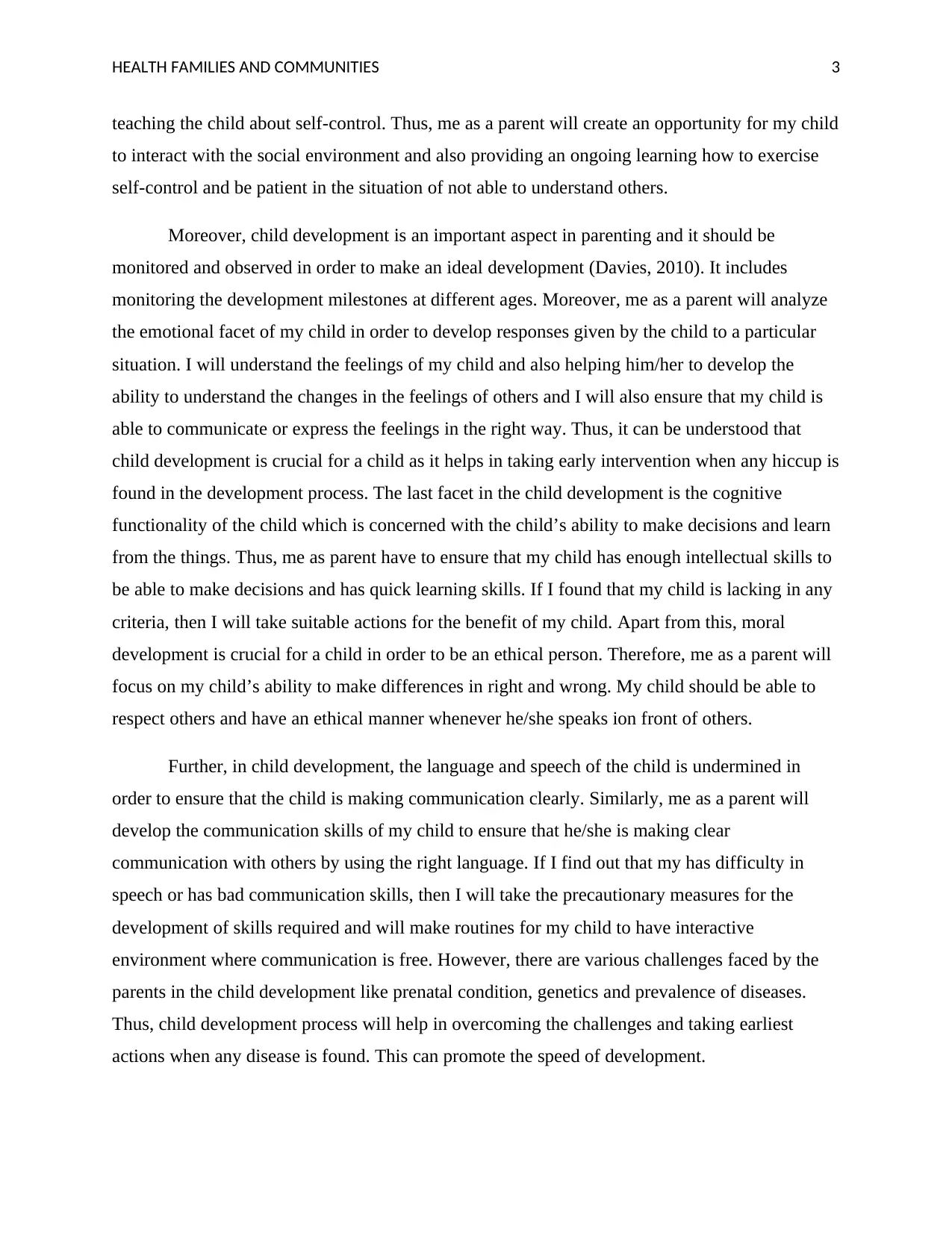
HEALTH FAMILIES AND COMMUNITIES 3
teaching the child about self-control. Thus, me as a parent will create an opportunity for my child
to interact with the social environment and also providing an ongoing learning how to exercise
self-control and be patient in the situation of not able to understand others.
Moreover, child development is an important aspect in parenting and it should be
monitored and observed in order to make an ideal development (Davies, 2010). It includes
monitoring the development milestones at different ages. Moreover, me as a parent will analyze
the emotional facet of my child in order to develop responses given by the child to a particular
situation. I will understand the feelings of my child and also helping him/her to develop the
ability to understand the changes in the feelings of others and I will also ensure that my child is
able to communicate or express the feelings in the right way. Thus, it can be understood that
child development is crucial for a child as it helps in taking early intervention when any hiccup is
found in the development process. The last facet in the child development is the cognitive
functionality of the child which is concerned with the child’s ability to make decisions and learn
from the things. Thus, me as parent have to ensure that my child has enough intellectual skills to
be able to make decisions and has quick learning skills. If I found that my child is lacking in any
criteria, then I will take suitable actions for the benefit of my child. Apart from this, moral
development is crucial for a child in order to be an ethical person. Therefore, me as a parent will
focus on my child’s ability to make differences in right and wrong. My child should be able to
respect others and have an ethical manner whenever he/she speaks ion front of others.
Further, in child development, the language and speech of the child is undermined in
order to ensure that the child is making communication clearly. Similarly, me as a parent will
develop the communication skills of my child to ensure that he/she is making clear
communication with others by using the right language. If I find out that my has difficulty in
speech or has bad communication skills, then I will take the precautionary measures for the
development of skills required and will make routines for my child to have interactive
environment where communication is free. However, there are various challenges faced by the
parents in the child development like prenatal condition, genetics and prevalence of diseases.
Thus, child development process will help in overcoming the challenges and taking earliest
actions when any disease is found. This can promote the speed of development.
teaching the child about self-control. Thus, me as a parent will create an opportunity for my child
to interact with the social environment and also providing an ongoing learning how to exercise
self-control and be patient in the situation of not able to understand others.
Moreover, child development is an important aspect in parenting and it should be
monitored and observed in order to make an ideal development (Davies, 2010). It includes
monitoring the development milestones at different ages. Moreover, me as a parent will analyze
the emotional facet of my child in order to develop responses given by the child to a particular
situation. I will understand the feelings of my child and also helping him/her to develop the
ability to understand the changes in the feelings of others and I will also ensure that my child is
able to communicate or express the feelings in the right way. Thus, it can be understood that
child development is crucial for a child as it helps in taking early intervention when any hiccup is
found in the development process. The last facet in the child development is the cognitive
functionality of the child which is concerned with the child’s ability to make decisions and learn
from the things. Thus, me as parent have to ensure that my child has enough intellectual skills to
be able to make decisions and has quick learning skills. If I found that my child is lacking in any
criteria, then I will take suitable actions for the benefit of my child. Apart from this, moral
development is crucial for a child in order to be an ethical person. Therefore, me as a parent will
focus on my child’s ability to make differences in right and wrong. My child should be able to
respect others and have an ethical manner whenever he/she speaks ion front of others.
Further, in child development, the language and speech of the child is undermined in
order to ensure that the child is making communication clearly. Similarly, me as a parent will
develop the communication skills of my child to ensure that he/she is making clear
communication with others by using the right language. If I find out that my has difficulty in
speech or has bad communication skills, then I will take the precautionary measures for the
development of skills required and will make routines for my child to have interactive
environment where communication is free. However, there are various challenges faced by the
parents in the child development like prenatal condition, genetics and prevalence of diseases.
Thus, child development process will help in overcoming the challenges and taking earliest
actions when any disease is found. This can promote the speed of development.
Paraphrase This Document
Need a fresh take? Get an instant paraphrase of this document with our AI Paraphraser
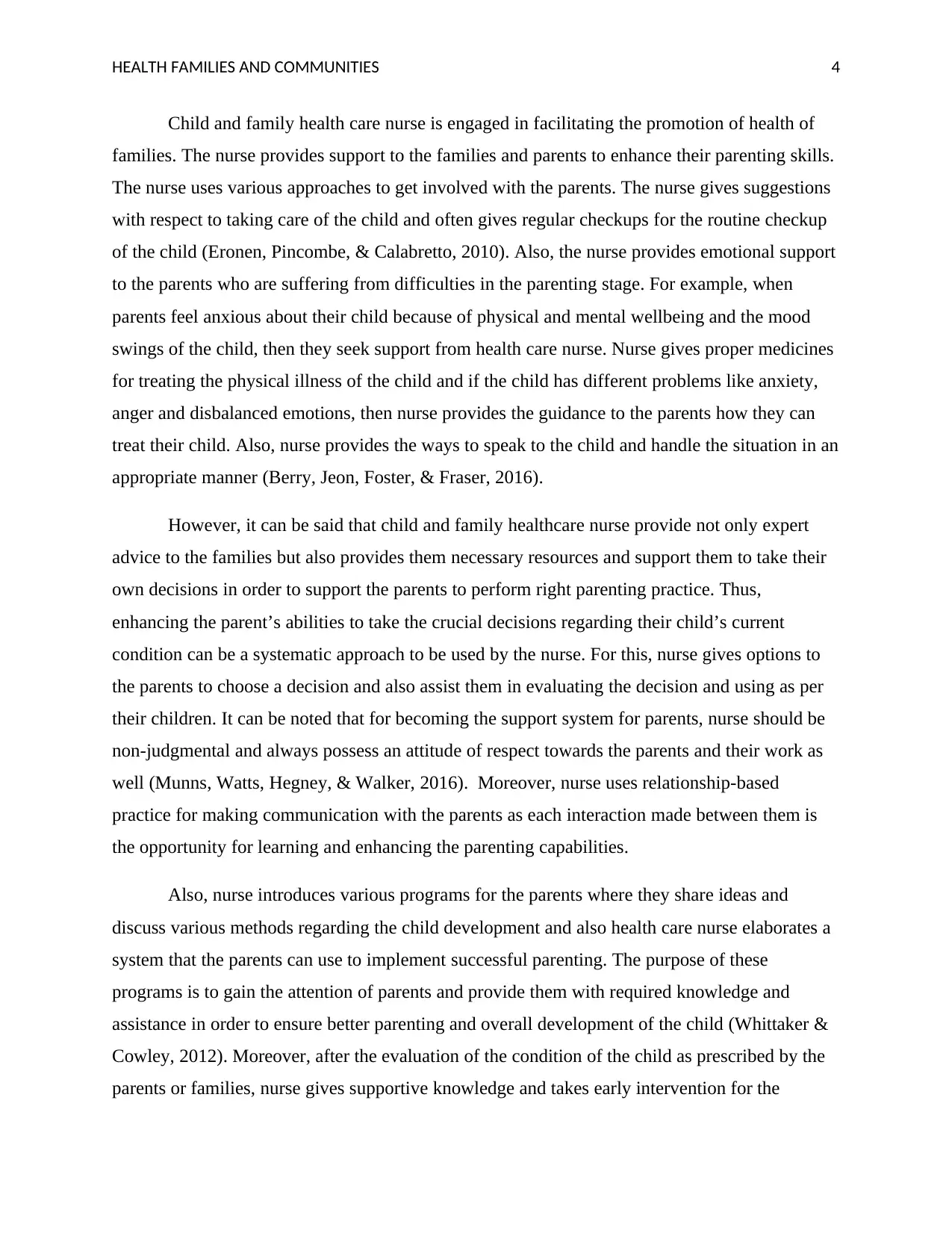
HEALTH FAMILIES AND COMMUNITIES 4
Child and family health care nurse is engaged in facilitating the promotion of health of
families. The nurse provides support to the families and parents to enhance their parenting skills.
The nurse uses various approaches to get involved with the parents. The nurse gives suggestions
with respect to taking care of the child and often gives regular checkups for the routine checkup
of the child (Eronen, Pincombe, & Calabretto, 2010). Also, the nurse provides emotional support
to the parents who are suffering from difficulties in the parenting stage. For example, when
parents feel anxious about their child because of physical and mental wellbeing and the mood
swings of the child, then they seek support from health care nurse. Nurse gives proper medicines
for treating the physical illness of the child and if the child has different problems like anxiety,
anger and disbalanced emotions, then nurse provides the guidance to the parents how they can
treat their child. Also, nurse provides the ways to speak to the child and handle the situation in an
appropriate manner (Berry, Jeon, Foster, & Fraser, 2016).
However, it can be said that child and family healthcare nurse provide not only expert
advice to the families but also provides them necessary resources and support them to take their
own decisions in order to support the parents to perform right parenting practice. Thus,
enhancing the parent’s abilities to take the crucial decisions regarding their child’s current
condition can be a systematic approach to be used by the nurse. For this, nurse gives options to
the parents to choose a decision and also assist them in evaluating the decision and using as per
their children. It can be noted that for becoming the support system for parents, nurse should be
non-judgmental and always possess an attitude of respect towards the parents and their work as
well (Munns, Watts, Hegney, & Walker, 2016). Moreover, nurse uses relationship-based
practice for making communication with the parents as each interaction made between them is
the opportunity for learning and enhancing the parenting capabilities.
Also, nurse introduces various programs for the parents where they share ideas and
discuss various methods regarding the child development and also health care nurse elaborates a
system that the parents can use to implement successful parenting. The purpose of these
programs is to gain the attention of parents and provide them with required knowledge and
assistance in order to ensure better parenting and overall development of the child (Whittaker &
Cowley, 2012). Moreover, after the evaluation of the condition of the child as prescribed by the
parents or families, nurse gives supportive knowledge and takes early intervention for the
Child and family health care nurse is engaged in facilitating the promotion of health of
families. The nurse provides support to the families and parents to enhance their parenting skills.
The nurse uses various approaches to get involved with the parents. The nurse gives suggestions
with respect to taking care of the child and often gives regular checkups for the routine checkup
of the child (Eronen, Pincombe, & Calabretto, 2010). Also, the nurse provides emotional support
to the parents who are suffering from difficulties in the parenting stage. For example, when
parents feel anxious about their child because of physical and mental wellbeing and the mood
swings of the child, then they seek support from health care nurse. Nurse gives proper medicines
for treating the physical illness of the child and if the child has different problems like anxiety,
anger and disbalanced emotions, then nurse provides the guidance to the parents how they can
treat their child. Also, nurse provides the ways to speak to the child and handle the situation in an
appropriate manner (Berry, Jeon, Foster, & Fraser, 2016).
However, it can be said that child and family healthcare nurse provide not only expert
advice to the families but also provides them necessary resources and support them to take their
own decisions in order to support the parents to perform right parenting practice. Thus,
enhancing the parent’s abilities to take the crucial decisions regarding their child’s current
condition can be a systematic approach to be used by the nurse. For this, nurse gives options to
the parents to choose a decision and also assist them in evaluating the decision and using as per
their children. It can be noted that for becoming the support system for parents, nurse should be
non-judgmental and always possess an attitude of respect towards the parents and their work as
well (Munns, Watts, Hegney, & Walker, 2016). Moreover, nurse uses relationship-based
practice for making communication with the parents as each interaction made between them is
the opportunity for learning and enhancing the parenting capabilities.
Also, nurse introduces various programs for the parents where they share ideas and
discuss various methods regarding the child development and also health care nurse elaborates a
system that the parents can use to implement successful parenting. The purpose of these
programs is to gain the attention of parents and provide them with required knowledge and
assistance in order to ensure better parenting and overall development of the child (Whittaker &
Cowley, 2012). Moreover, after the evaluation of the condition of the child as prescribed by the
parents or families, nurse gives supportive knowledge and takes early intervention for the
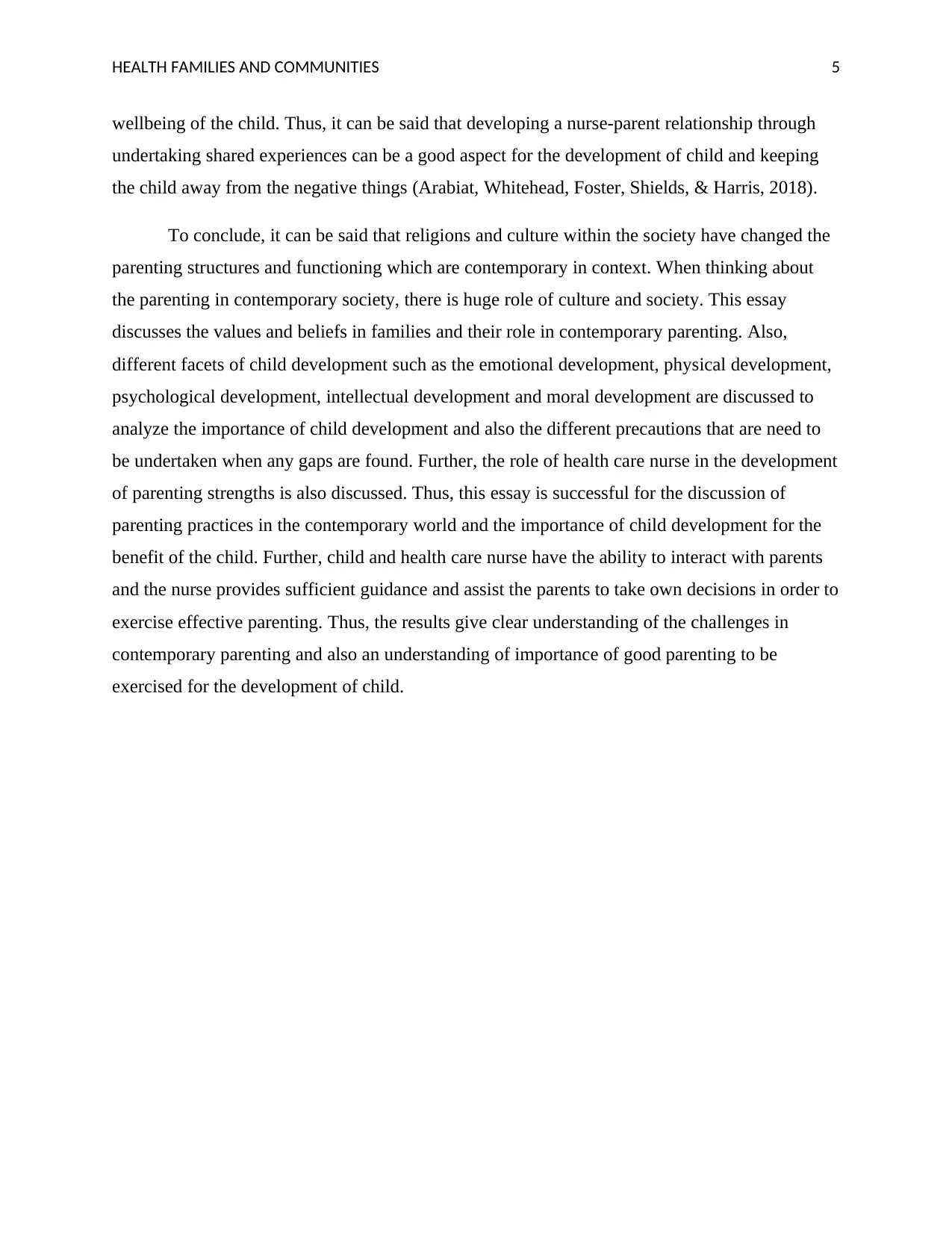
HEALTH FAMILIES AND COMMUNITIES 5
wellbeing of the child. Thus, it can be said that developing a nurse-parent relationship through
undertaking shared experiences can be a good aspect for the development of child and keeping
the child away from the negative things (Arabiat, Whitehead, Foster, Shields, & Harris, 2018).
To conclude, it can be said that religions and culture within the society have changed the
parenting structures and functioning which are contemporary in context. When thinking about
the parenting in contemporary society, there is huge role of culture and society. This essay
discusses the values and beliefs in families and their role in contemporary parenting. Also,
different facets of child development such as the emotional development, physical development,
psychological development, intellectual development and moral development are discussed to
analyze the importance of child development and also the different precautions that are need to
be undertaken when any gaps are found. Further, the role of health care nurse in the development
of parenting strengths is also discussed. Thus, this essay is successful for the discussion of
parenting practices in the contemporary world and the importance of child development for the
benefit of the child. Further, child and health care nurse have the ability to interact with parents
and the nurse provides sufficient guidance and assist the parents to take own decisions in order to
exercise effective parenting. Thus, the results give clear understanding of the challenges in
contemporary parenting and also an understanding of importance of good parenting to be
exercised for the development of child.
wellbeing of the child. Thus, it can be said that developing a nurse-parent relationship through
undertaking shared experiences can be a good aspect for the development of child and keeping
the child away from the negative things (Arabiat, Whitehead, Foster, Shields, & Harris, 2018).
To conclude, it can be said that religions and culture within the society have changed the
parenting structures and functioning which are contemporary in context. When thinking about
the parenting in contemporary society, there is huge role of culture and society. This essay
discusses the values and beliefs in families and their role in contemporary parenting. Also,
different facets of child development such as the emotional development, physical development,
psychological development, intellectual development and moral development are discussed to
analyze the importance of child development and also the different precautions that are need to
be undertaken when any gaps are found. Further, the role of health care nurse in the development
of parenting strengths is also discussed. Thus, this essay is successful for the discussion of
parenting practices in the contemporary world and the importance of child development for the
benefit of the child. Further, child and health care nurse have the ability to interact with parents
and the nurse provides sufficient guidance and assist the parents to take own decisions in order to
exercise effective parenting. Thus, the results give clear understanding of the challenges in
contemporary parenting and also an understanding of importance of good parenting to be
exercised for the development of child.
⊘ This is a preview!⊘
Do you want full access?
Subscribe today to unlock all pages.

Trusted by 1+ million students worldwide
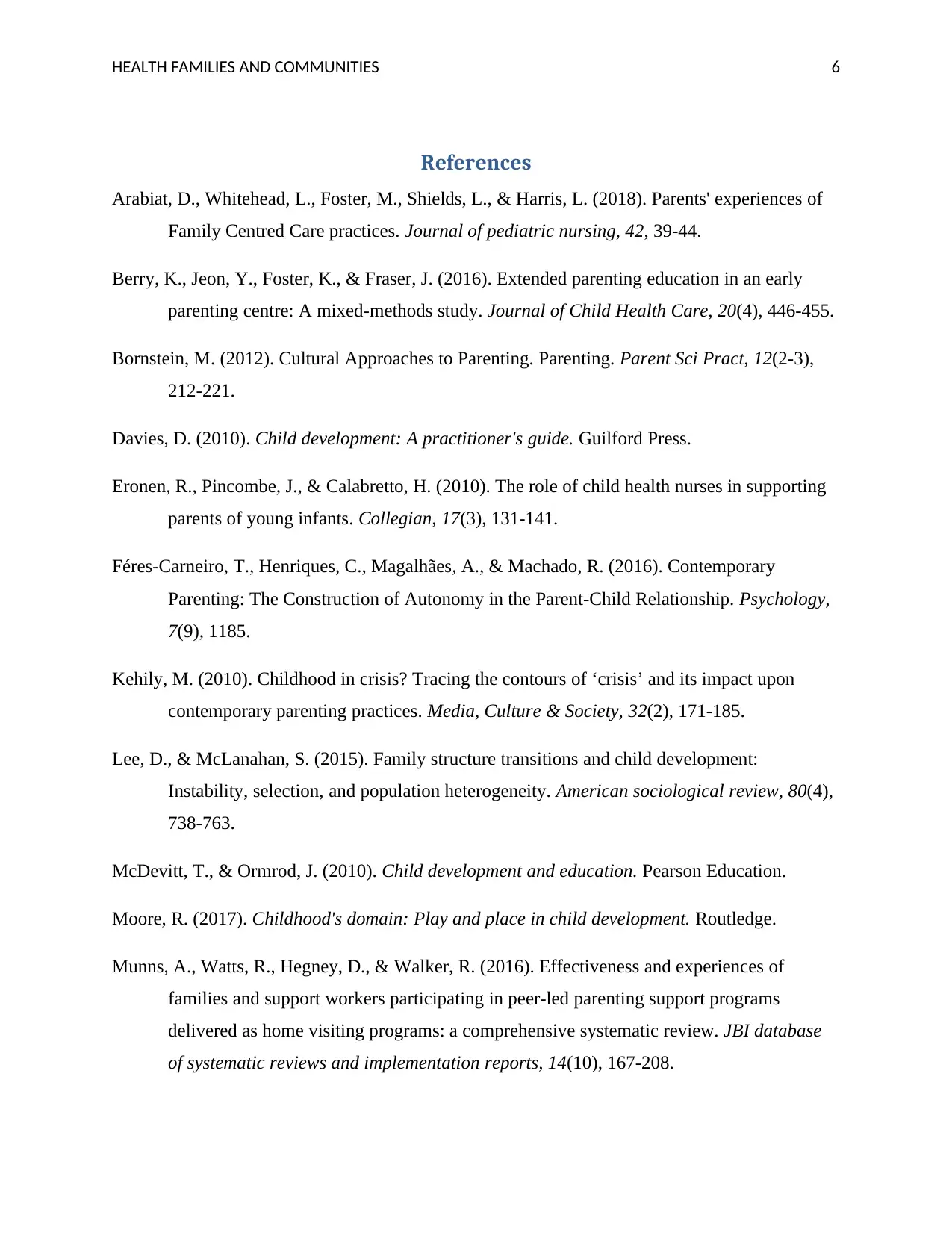
HEALTH FAMILIES AND COMMUNITIES 6
References
Arabiat, D., Whitehead, L., Foster, M., Shields, L., & Harris, L. (2018). Parents' experiences of
Family Centred Care practices. Journal of pediatric nursing, 42, 39-44.
Berry, K., Jeon, Y., Foster, K., & Fraser, J. (2016). Extended parenting education in an early
parenting centre: A mixed-methods study. Journal of Child Health Care, 20(4), 446-455.
Bornstein, M. (2012). Cultural Approaches to Parenting. Parenting. Parent Sci Pract, 12(2-3),
212-221.
Davies, D. (2010). Child development: A practitioner's guide. Guilford Press.
Eronen, R., Pincombe, J., & Calabretto, H. (2010). The role of child health nurses in supporting
parents of young infants. Collegian, 17(3), 131-141.
Féres-Carneiro, T., Henriques, C., Magalhães, A., & Machado, R. (2016). Contemporary
Parenting: The Construction of Autonomy in the Parent-Child Relationship. Psychology,
7(9), 1185.
Kehily, M. (2010). Childhood in crisis? Tracing the contours of ‘crisis’ and its impact upon
contemporary parenting practices. Media, Culture & Society, 32(2), 171-185.
Lee, D., & McLanahan, S. (2015). Family structure transitions and child development:
Instability, selection, and population heterogeneity. American sociological review, 80(4),
738-763.
McDevitt, T., & Ormrod, J. (2010). Child development and education. Pearson Education.
Moore, R. (2017). Childhood's domain: Play and place in child development. Routledge.
Munns, A., Watts, R., Hegney, D., & Walker, R. (2016). Effectiveness and experiences of
families and support workers participating in peer-led parenting support programs
delivered as home visiting programs: a comprehensive systematic review. JBI database
of systematic reviews and implementation reports, 14(10), 167-208.
References
Arabiat, D., Whitehead, L., Foster, M., Shields, L., & Harris, L. (2018). Parents' experiences of
Family Centred Care practices. Journal of pediatric nursing, 42, 39-44.
Berry, K., Jeon, Y., Foster, K., & Fraser, J. (2016). Extended parenting education in an early
parenting centre: A mixed-methods study. Journal of Child Health Care, 20(4), 446-455.
Bornstein, M. (2012). Cultural Approaches to Parenting. Parenting. Parent Sci Pract, 12(2-3),
212-221.
Davies, D. (2010). Child development: A practitioner's guide. Guilford Press.
Eronen, R., Pincombe, J., & Calabretto, H. (2010). The role of child health nurses in supporting
parents of young infants. Collegian, 17(3), 131-141.
Féres-Carneiro, T., Henriques, C., Magalhães, A., & Machado, R. (2016). Contemporary
Parenting: The Construction of Autonomy in the Parent-Child Relationship. Psychology,
7(9), 1185.
Kehily, M. (2010). Childhood in crisis? Tracing the contours of ‘crisis’ and its impact upon
contemporary parenting practices. Media, Culture & Society, 32(2), 171-185.
Lee, D., & McLanahan, S. (2015). Family structure transitions and child development:
Instability, selection, and population heterogeneity. American sociological review, 80(4),
738-763.
McDevitt, T., & Ormrod, J. (2010). Child development and education. Pearson Education.
Moore, R. (2017). Childhood's domain: Play and place in child development. Routledge.
Munns, A., Watts, R., Hegney, D., & Walker, R. (2016). Effectiveness and experiences of
families and support workers participating in peer-led parenting support programs
delivered as home visiting programs: a comprehensive systematic review. JBI database
of systematic reviews and implementation reports, 14(10), 167-208.
Paraphrase This Document
Need a fresh take? Get an instant paraphrase of this document with our AI Paraphraser
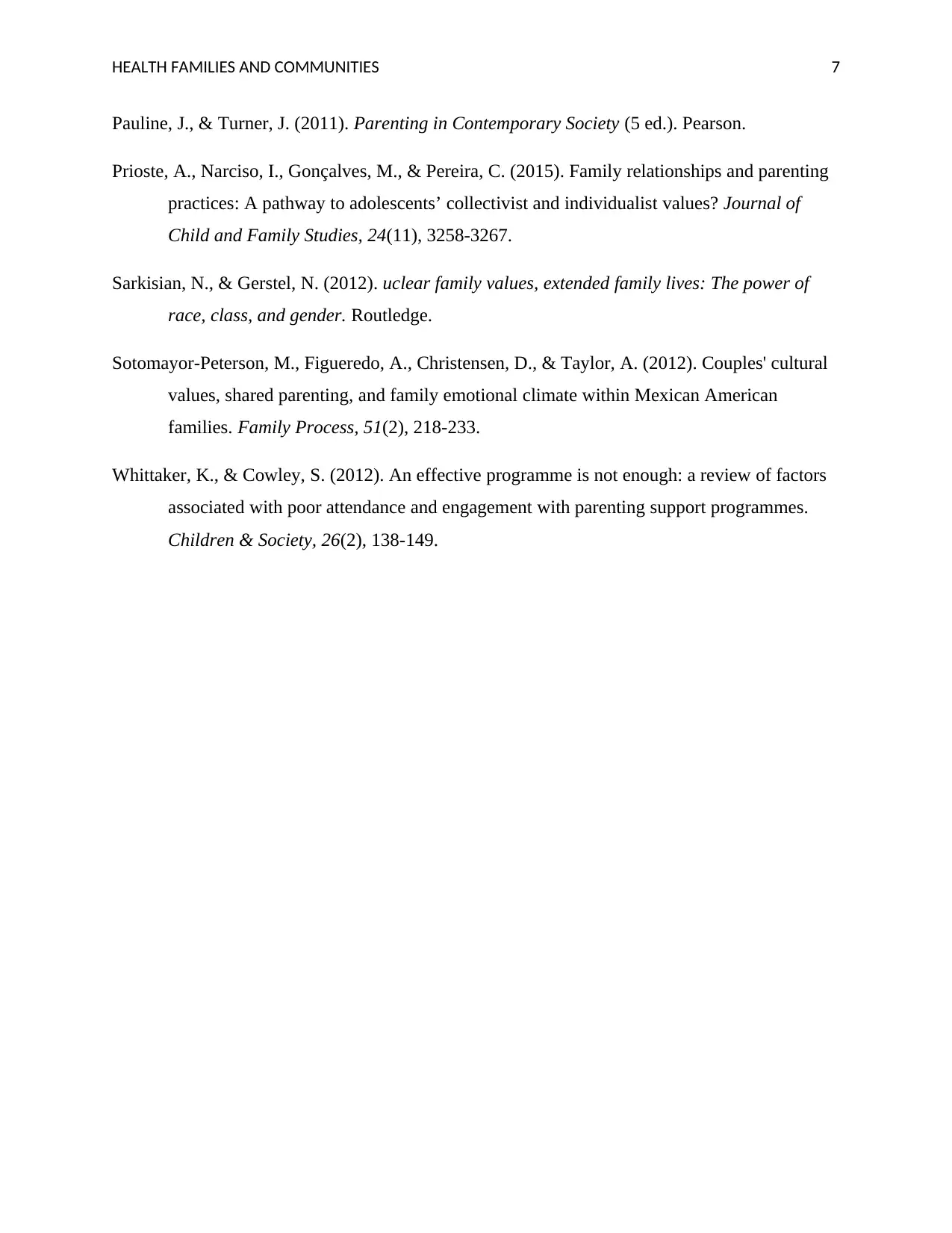
HEALTH FAMILIES AND COMMUNITIES 7
Pauline, J., & Turner, J. (2011). Parenting in Contemporary Society (5 ed.). Pearson.
Prioste, A., Narciso, I., Gonçalves, M., & Pereira, C. (2015). Family relationships and parenting
practices: A pathway to adolescents’ collectivist and individualist values? Journal of
Child and Family Studies, 24(11), 3258-3267.
Sarkisian, N., & Gerstel, N. (2012). uclear family values, extended family lives: The power of
race, class, and gender. Routledge.
Sotomayor‐Peterson, M., Figueredo, A., Christensen, D., & Taylor, A. (2012). Couples' cultural
values, shared parenting, and family emotional climate within Mexican American
families. Family Process, 51(2), 218-233.
Whittaker, K., & Cowley, S. (2012). An effective programme is not enough: a review of factors
associated with poor attendance and engagement with parenting support programmes.
Children & Society, 26(2), 138-149.
Pauline, J., & Turner, J. (2011). Parenting in Contemporary Society (5 ed.). Pearson.
Prioste, A., Narciso, I., Gonçalves, M., & Pereira, C. (2015). Family relationships and parenting
practices: A pathway to adolescents’ collectivist and individualist values? Journal of
Child and Family Studies, 24(11), 3258-3267.
Sarkisian, N., & Gerstel, N. (2012). uclear family values, extended family lives: The power of
race, class, and gender. Routledge.
Sotomayor‐Peterson, M., Figueredo, A., Christensen, D., & Taylor, A. (2012). Couples' cultural
values, shared parenting, and family emotional climate within Mexican American
families. Family Process, 51(2), 218-233.
Whittaker, K., & Cowley, S. (2012). An effective programme is not enough: a review of factors
associated with poor attendance and engagement with parenting support programmes.
Children & Society, 26(2), 138-149.
1 out of 8
Related Documents
Your All-in-One AI-Powered Toolkit for Academic Success.
+13062052269
info@desklib.com
Available 24*7 on WhatsApp / Email
![[object Object]](/_next/static/media/star-bottom.7253800d.svg)
Unlock your academic potential
Copyright © 2020–2026 A2Z Services. All Rights Reserved. Developed and managed by ZUCOL.





